Coronavirus puts the nation on ‘war footing’
Australia has effectively closed its borders, mandating international arrivals be forced into 14-day self-isolation as the response ramps up.
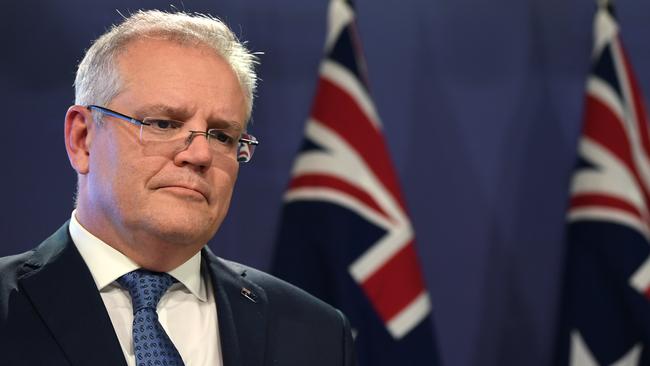
Australia has effectively closed its borders, mandating international airport arrivals be forced into 14-day self-isolation as the coronavirus response is ramped up in an effort to slow the spread of the disease after a 20 per cent jump in cases on Sunday and a fifth death.
Restrictions will be slapped on visitors to aged-care homes, and schools could be closed within weeks.
LIVE | Follow the latest developments in the rapidly escalating virus crisis here
The national cabinet, comprising Scott Morrison and state and territory leaders, has been warned of an explosion in new infections over the next two months as COVID-19 cases across Australia surged towards 300 on Sunday.
While school closures have not been announced, the national cabinet is expected to consider wider restrictions on Friday as part of a staged response to “flatten the curve” of cases and ease pressure on the hospital system.
The government has also changed the name of its national crisis committee, set up in the wake of the September 11 terrorist attacks, to the national co-ordination mechanism, in a bid to avoid public hysteria.
The rebadged crisis committee gives the federal, state and territory governments sweeping powers to enforce strict non-health measures in response to the escalating coronavirus outbreak.
A senior government source said “we are now effectively on a war footing”. The number of coronavirus cases across Australia jumped 20 per cent on Sunday, with infections in Queensland increasing from 46 to 61 over 24 hours.
The national death toll rose to five after tests confirmed COVID-19 was responsible for the deaths of a 90-year-old female resident at the Dorothy Henderson Lodge nursing home in Sydney on Saturday and a 77-year-old Queensland woman in a Sydney hospital on Friday.
Chief Medical Officer Brendan Murphy said authorities were considering a “focal” lockdown of coronavirus hotspot suburbs and communities in a move like those adopted in Italy and South Korea.
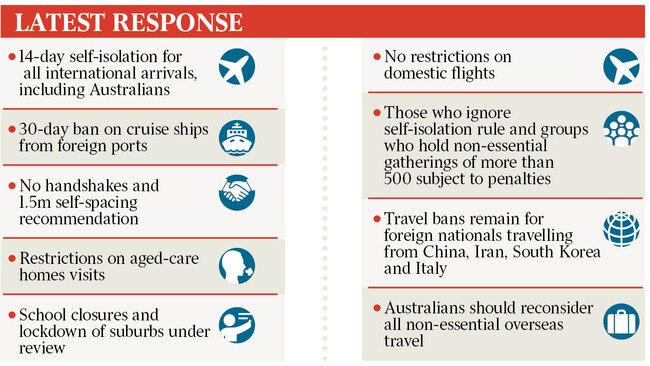
“One of the things we know about outbreaks of infections is that they can affect one part of a country, not another,” Professor Murphy told the ABC on Sunday.
The Prime Minister followed New Zealand’s lead in imposing two-week mandatory self-isolation for all international visitors, with South Pacific residents allowed to pass through Australia on their way home. Flight crews will not have to self-isolate, but will be asked to practise “social distancing”.
The move has received the support of the states, which will be responsible for enforcing the public health edict, with penalties for non-compliance including 12 months’ jail or fines of up to $50,000 in some jurisdictions.
Mr Morrison, who presented a series of COVID-19 scenario graphs explaining crackdowns on mass gatherings and impressing the importance of avoiding a damaging peak in cases, also banned cruise ships from foreign ports docking in Australia for an initial 30-day period. After a meeting of the national security committee of cabinet and national cabinet on Sunday, Mr Morrison said medical experts had advised that Australians should avoid handshakes or intimate contact and keep a distance of 1.5m from other people.
“The social distancing practices that we’re encouraging are being expanded. So there’s no more handshakes,” Mr Morrison said.
He said the national cabinet would meet on Tuesday night to consider advice from health authorities on restrictions on aged-care visits and gatherings involving enclosed areas. “For older Australians and those that are more vulnerable, particularly those in remote communities and those with pre-existing health conditions, it is a far more serious virus, and that is our concern. Our aim in all of this is to protect the most vulnerable. The most at risk,” he said.
Mr Morrison warned that individuals who flouted the self-isolation rule or groups who held non-essential mass gatherings of more than 500 people would be subject to penalties imposed by state and territory governments.
“Once state authorities are in a position to give that its legal enforcement then that will be a change. So if your mate has been in Bali and they come back and they turn up at work, and they’re sitting next to you, well, they’ll be committing an offence,” he said.
On shutting down schools, Mr Morrison said the national cabinet would discuss the matter on Friday but he was not immediately moving to broadscale closures.
“When you take children out of schools and put them back in the broader community, the ability for them to potentially engage with others increases that risk,” he said.
“The other issue is the disruption impact that can have and put at great risk the availability of critical workers such as nurses and doctors and others who are essential in the community because they would have to remain home and look after their children.”
Geelong Grammar advised on Saturday the school would cut the term short at its four campuses, while Melbourne’s Carey Grammar remained closed after a Year 10 student tested positive. Courts in NSW and Victoria have also suspended upcoming jury trials.
In addition to enforcing bans on mass gatherings and restrictions around aged-care centres and schools, authorities have used the national co-ordination mechanism to lift working visa restrictions for overseas students to help Coles and Woolworths in restocking shelves. Truck delivery curfews were also eased to allow goods including toilet paper to be dropped off at supermarkets.
With critical infrastructure also falling under the mechanism, Energy Minister Angus Taylor has put COVID-19 at the top of the COAG Energy Council meeting agenda in Brisbane on Friday.
The Energy Department has established an “emergency management team” to provide regular updates on security of the national electricity market. Mr Taylor’s office has also contacted energy retailers, generators, transmission and market operators to ensure they have emergency plans in place.
Anthony Albanese called for “substance, not spin” in responding to the crisis and said the government could deliver more consistent advice on when to self-isolate and ensure more Australians were tested quickly.
Mr Morrison on Sunday confirmed he was speaking with Five Eyes leaders, including Boris Johnson, and was supporting a push by Indian Prime Minister Narendra Modi for a special G20 leaders’ “link-up”.
After the positive test of Home Affairs Minister Peter Dutton’s last Friday, Mr Morrison said he had cancelled events in his schedule and flagged that MPs would restrict public contact.

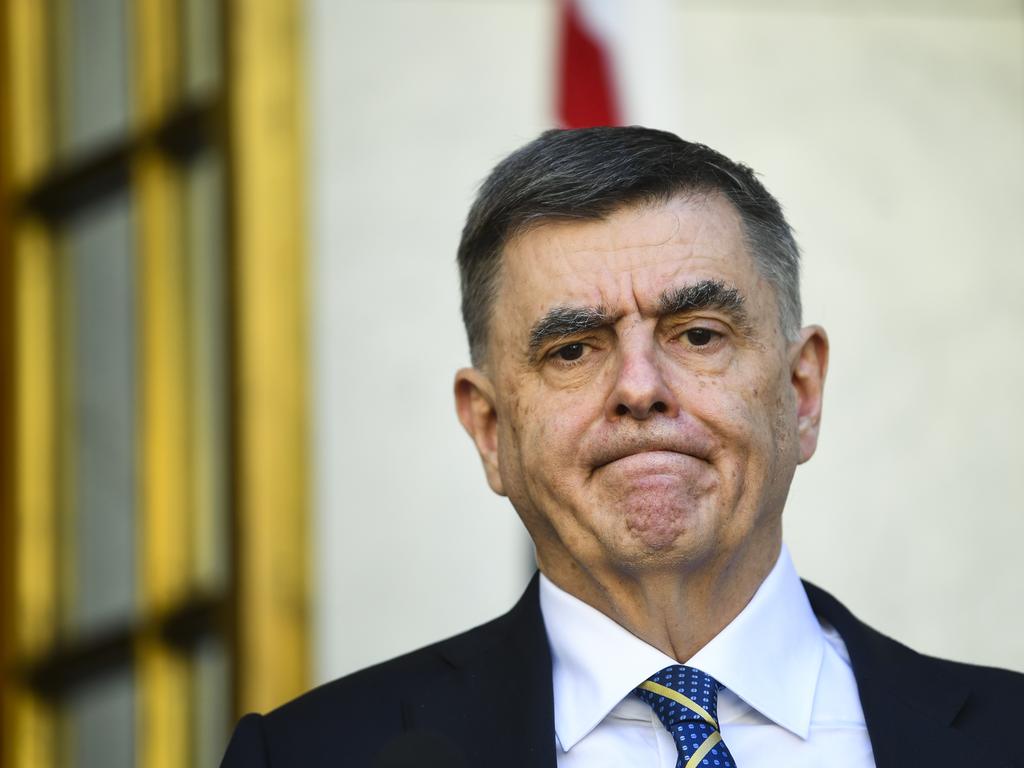
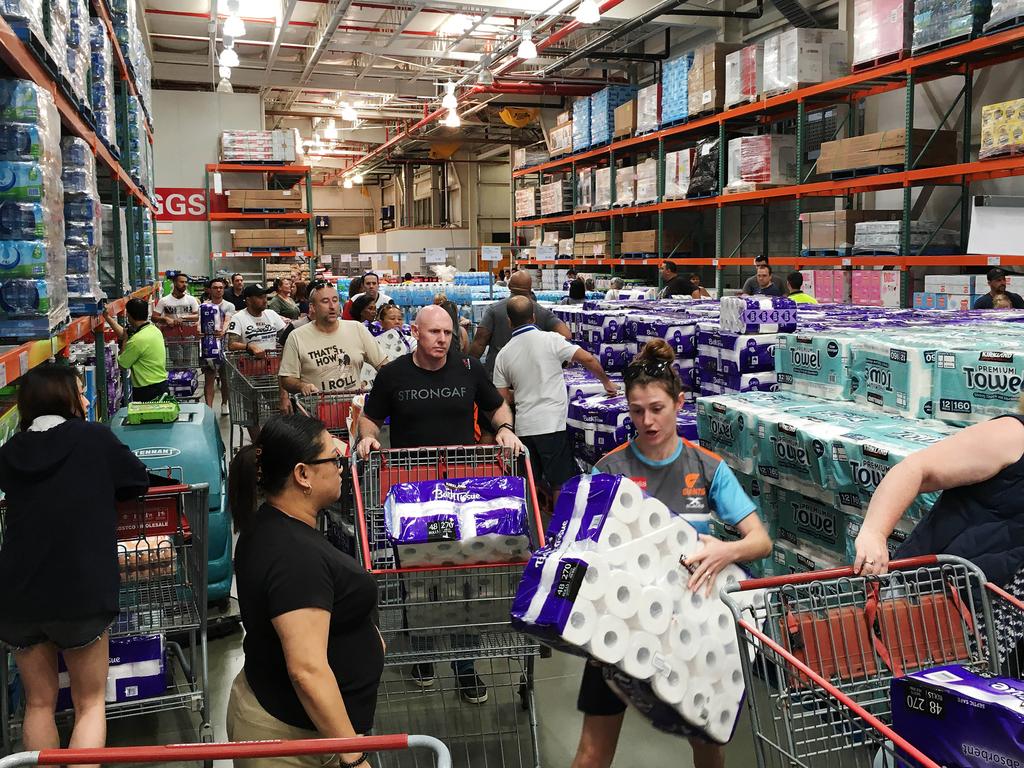
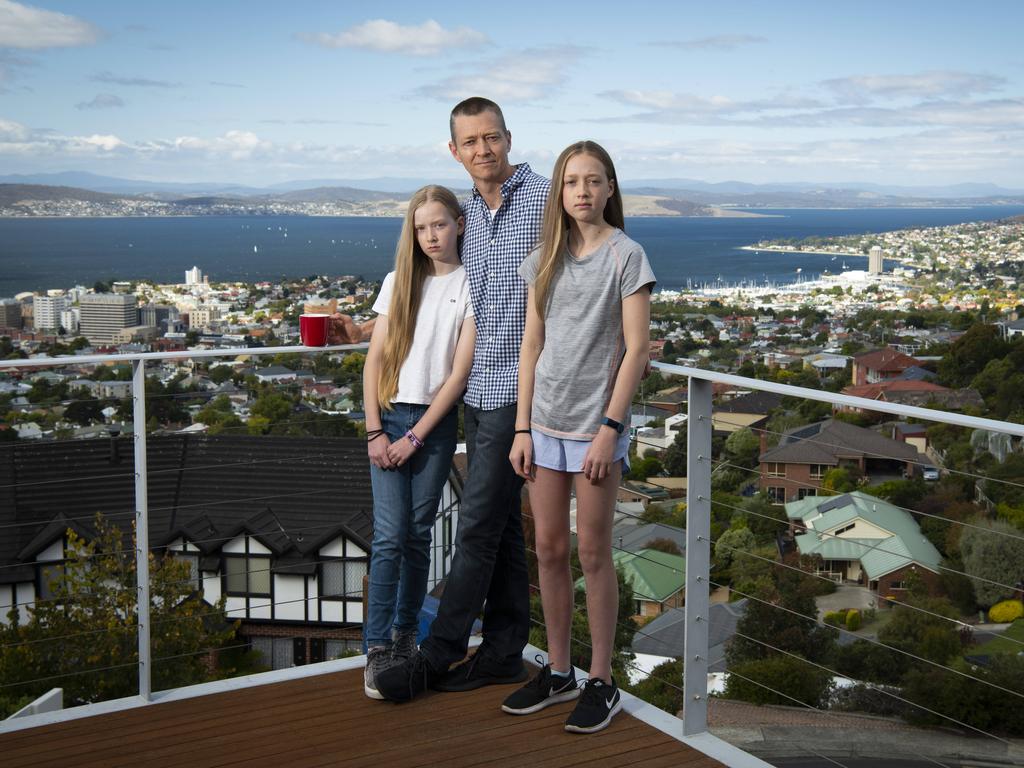



To join the conversation, please log in. Don't have an account? Register
Join the conversation, you are commenting as Logout